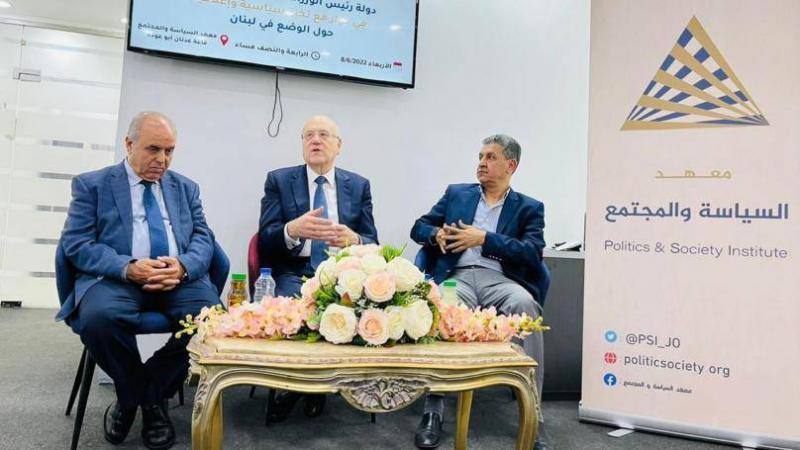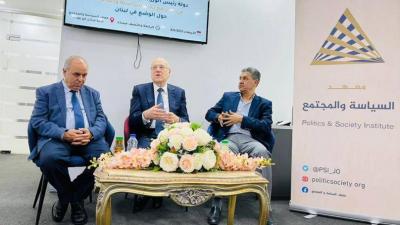Caretaker Prime Minister Najib Mikati emphasized the necessity for the parliamentary council to choose whoever it deems fit to form the new government, and that the government formation process should occur without conditions and complications set by any party against the appointed president. He stressed that "presidential elections may be delayed, but they will happen."
Mikati attended a dialogue meeting at the "Institute of Politics and Society" in the Jordanian capital, Amman, in the presence of the institute's honorary president, Prince Shaker bin Zaid, and the chairman of the board of trustees, Azmi Muhafazah, with the discussion moderated by media professional and political analyst Omar Kallab.
The president started his analysis of the Lebanese situation by reflecting on historical and political contexts over past decades, leading up to the recent elections, and the expected scenarios regarding government formation, presidential elections, and relations among different political forces. He stated, "Lebanon is at a crossroads, and it is impossible to continue on the same path that has prevailed; thus, we must start from the Taif Agreement, strengthen it, and build upon it, developing what needs to be improved."
He emphasized the importance of decentralization as outlined in the Taif Agreement, considering it a suitable option for the upcoming phase to address political and administrative situations while maintaining the unity of the Lebanese state within an organized framework for its residents. Responding to a question about decentralization, he explained that it encompasses everything needed to provide spaces of freedom and privacy for the various components of the Lebanese situation and aims to reduce ongoing daily tensions.
Mikati stressed the need to reach a national dialogue table to discuss "what kind of Lebanon we want." He also highlighted the necessity to complete the implementation of the Taif Agreement regarding the abolition of political sectarianism, the establishment of a Senate, and the approval of a new electoral law based on national principles.
On the economic front, he pointed out the magnitude and seriousness of the economic crisis but affirmed that Lebanon would overcome this challenging phase if it adhered to the outlined path by implementing the agreement with the International Monetary Fund and enacting essential reforms to set Lebanon on the path to recovery.
Regarding maritime border demarcation, Mikati confirmed the commitment to resolving the dispute through American mediator Amos Hochstein, stressing that all relevant parties prioritize maintaining stability in Lebanon.
Concerning the government file and the possibility of being appointed again, he noted that anyone familiar with the Lebanese situation, including himself, recognizes the difficulties and complexities of the current phase. Therefore, he stated that he is not seeking this matter and hopes the parliamentary council will expedite the selection of a suitable candidate, allowing for rapid government formation without conditions or complications imposed by any party on the appointed president.
Mikati affirmed that with the composition of the new parliamentary council, it has become difficult for any party to obstruct the elections, and thus, the possibility of conducting the elections is now more likely than it was a few months ago. He continued in response to a question: "Presidential elections may be delayed, but they will happen."




